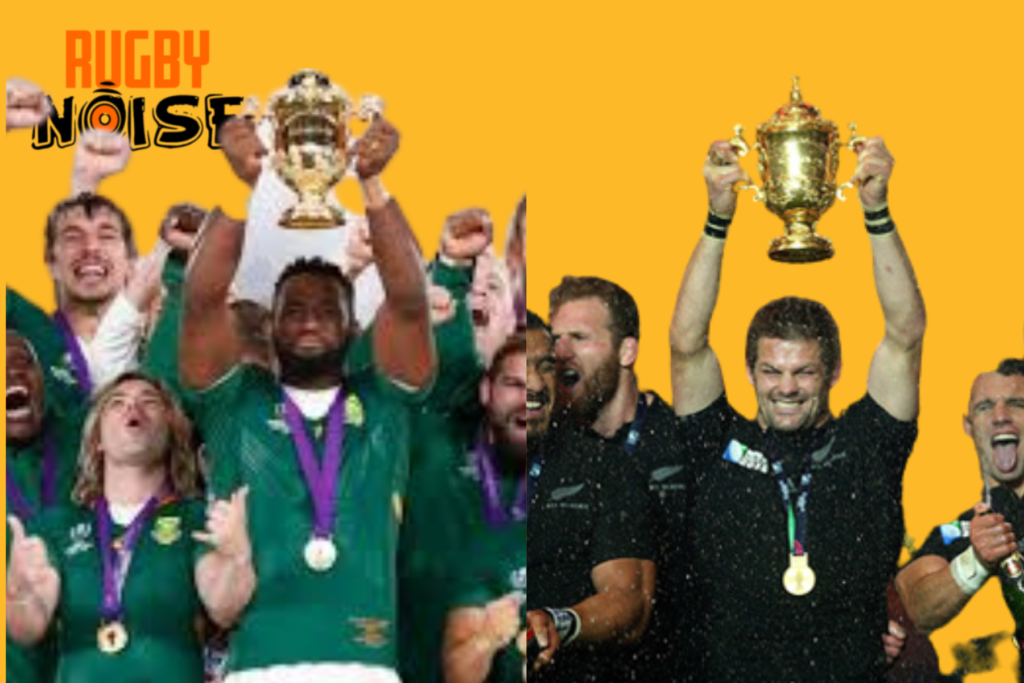In rugby, no other competition comes close to comparing to the Rugby World Cup. Held every four years, the contest is the ultimate proving ground where the world’s best battle it out for the sport’s highest honor – the prestigious Webb Ellis Cup. Since its formation three and half decades ago in 1987, the coveted trophy has only been claimed by four countries – New Zealand, South Africa, Australia and England. Of the lot, only New Zealand, South Africa and Australia have won it more than once and New Zealand and South Africa have clinched the title on more than two separate occasions.
Which country has the most Rugby World Cups? New Zealand and South Africa have jointly won the most Rugby World Cups with a record three each. The All Blacks won the inaugural competition in 1987 as well as the 2011 and 2015 editions of the tournament. On the other hand, the Springboks were the last team standing in 1995, 2007 and most recently in 2019 making them reigning world champions.

Drawing First Blood
Considered by many as the best national rugby union team of all time, New Zealand have garnered a fearsome reputation over the years by constantly establishing themselves as the team to beat in all top rugby competitions.
Despite being one of the oldest rugby union teams, New Zealand has managed to stay relevant by constantly evolving and adapting to the challenges that the sport and its peers have presented. Many rugby historians and pundits agree that to tell the story of the Rugby World Cup is to tell the story of the All Blacks.
Rugby has been part and parcel of New Zealand’s culture and identity since the sport was introduced in the country in 1870 by the legendary Charles Monro with their nationally rugby union following 22 years later in 1892.
The team went on to make their international debut in 1903 handing them over eight decades of high-level experience by the time of the inaugural Rugby World Cup in 1987, which they co-hosted alongside Australia.
New Zealand was dominant throughout the competition and won all their matches without much opposition. The team first topped their pool which also included Fiji, Italy and Argentina. They then proceeded to outclass Scotland in the quarter-finals before obliterating Wales in the semi-finals.
Their finals opponent, France, had a more challenging path beating Fiji and Australia in tough fixtures. Les Bleus however met their match falling 29-9 to New Zealand, who claimed the first-ever Rugby World Cup.
Late to the Party
The Story of the South Africa National Rugby Union team is one of stifled potential. Despite predating their New Zealand counterparts by a year, the Boks’ participation in international competitions was limited by its divisive and widely-condemned apartheid policy which ran from 1948 to the early 1990s.
Things became particularly difficult for the Amabokoboko from the 1960s after South Africa began to face a fresh wave of condemnation and criticism from the international community after racially instigated incidents that culminated in the infamous Sharpeville Massacre occurred.
Over the following two decades, a number of countries including New Zealand and France boycotted test matches with the Springboks. 28 countries further boycotted the 1976 Summer Olympics in protest of apartheid and championed the passing of the Gleneagles Agreement that ended up isolating South Africa from the mid-80s to the early 90s.
The International Rugby Board (IRB) followed suit banning South Africa from taking part in the 1987 and 1991 Rugby World Cups. The abolition of apartheid however led to their readmission in 1992. The goodwill the country gained thereafter allowed them to host the 1995 Rugby World Cup, which the Springboks went on to win.
The Springboks started off the competition by topping their group which included heavy-hitters Australia as well as Canada and Romania. They then beat Western Samoa and France in the quarter-finals and semifinals respectively before narrowly edging New Zealand 15-12 in the final.
Heated Rivalries & Double Glory
The All Blacks and the Springboks have jointly won four of the last Rugby World Cups. The teams. They have also met in two Rugby World Cup finals – the 1995 and 2019 editions with South Africa winning the former and New Zealand winning the latter.
The two teams also met in the semi-finals of the 2015 World Cup meaning that they have been in each other’s way on three key occasions. There have nevertheless been other worthy opponents along the way, particularly Australia and England.
To win the 2007 Rugby World Cup – their second honor – South Africa held off stiff competition from England, Samoa, Tonga and the United States in the pool stages. The Bokke then triumphed over Fiji and Argentina in the quarter-finals and semifinals respectively before thrashing England 15-6 in the final.
New Zealand struggled in that edition, exiting the competition at the quarter-finals stage after narrowly losing to France. The All Blacks nevertheless redeemed themselves in the 2011 Rugby World Cup by beating Les Bleus in both their pool fixtures and the final to win their second Rugby World Cup.
They then defended their title in the following tournament in 2015 becoming the only team to date to do so. New Zealand first won their pool by beating the likes of Tonga, Namibia and an Argentine side.
In the quarter-finals, the All Blacks continued their dominance over France before meeting South Africa in the semi-finals. The Springboks offered them the toughest challenge of the competition, which they managed to overcome to proceed 20-18. New Zealand then beat Australia 34-17 in the final to win their third and final Rugby World Cup to date.
The 2019 Rugby World Cup was an anomaly in many ways. South Africa and New Zealand were placed in the same pool for the first time in the competition’s history finishing their pool fixtures just a point apart in second and first place respectively.
The All Blacks appeared on course to win their third consecutive World Cup trophy after thrashing Ireland 46-14 in the quarter-finals before imploding against England in the semi-finals. The Springboks took their pool defeat in stride and beat Japan and Wales in the quarter-finals and semifinals respectively before registering a convincing 32-12 victory over England in the final.
Looking Ahead
Surprisingly, bookmakers have neither the Springboks nor the All Blacks as favorites to win the upcoming 2023. Instead, the odds are heavily in favor of hosts France, who many believe are on course to win their first Rugby World Cup.
Indeed, Les Bleus have a great opportunity to make history as they have a talented young squad that is composed of star players like Demba Baba, Christopher Tolofua and Captain Charles Ollivon.
Though New Zealand and South Africa have the second and fourth best odds respectively, they are both expected to have remarkable outings alongside the likes of England and Scotland.
